
Maria J. Azocar
Maria J. Azocar is a doctoral candidate in the University of Wisconsin-Madison Department of Sociology. She received her M.A. degree in Sociology at UW-Madison and her B.A. degree in Sociology at the Universidad Catolica of Chile. Her research and teaching interests are at the intersection of the sociology of law, sociology of expertise, sociology of professions, and the sociology of gender. With studies that primarily rely on qualitative data, Maria investigates how gender, in combination with other power differentials, influences the construction of expertise.
Much of her research has an empirical focus in Chile and how Chilean lawyers have competed for the recognition of their expertise at moments of policy reforms. For her dissertation, she is studying the policy debates on pension reform in Chile and how lawyers in interaction with economists and social scientists have constructed the boundaries of their expert knowledge. Maria has published her research in journals such as Gender & Society, Latin American Research Review, Sociology Compass, Latin American Perspectives, and Revista de Derecho (Valdivia) Chile.
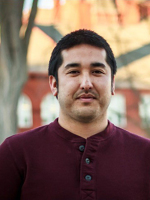
Jimmy Taitano Camacho
Jimmy Taitano Camacho is a graduate student pursuing a PhD in Land Policy and Indigenous Methodologies at the University of Wisconsin-Madison. He is particularly interested in understanding how Indigenous peoples across Oceania are resisting, struggling with, and decolonizing dominant property regimes and institutions. His dissertation examines the Chamorro Land Trust (CLT), an institution created by I Liheslaturan Guåhan (the Guam Legislature). Enacted in 1975, the purpose of the CLT is to return tano (land) to Chamorros—the Indigenous people of Guåhan (Guam)—and ensure that they have tano in Guåhan, forever. Jimmy’s work grapples with the imposition and circumstances of United States colonialism and militarism across Oceania and in Guåhan, one of the few remaining colonies in the world that are recognized by the United Nations. He draws on the field of critical Indigenous studies, feminist and queer theory, and Indigenous Planning, an emerging and distinct scholarly discipline and practice.
Jimmy is Chamorro and grew up in Guåhan. After earning an B.A. in Urban Studies at San Diego State University, Jimmy returned home. He served as a Senior Policy Analyst for Senator Thomas C. Ada before returning to graduate school. Jimmy holds an M.S. in Urban and Regional Planning with a focus in land policy and urban design. During his tenure as a Law and Society Graduate Fellow in the University of Wisconsin-Madison Institute of Legal Studies, he will be collecting and analyzing ethnographic data in Guåhan. Jimmy has presented his research at the Annual Native American and Indigenous Studies Association Conference and is a member of the Association of Collegiate Planning Schools. He welcomes the opportunity to collaborate and participate in discussions and projects aimed at restoring and protecting the land tenure of Indigenous peoples.

Caroline Griffith
Caroline Griffith is a Ph.D. student at the University of Wisconsin-Madison Department of Geography, where she researches issues around property, energy, and inheritance in western North Dakota. Ranked second in the country for crude oil production and sixth for wind production, North Dakota has a complex relationship between agricultural, tribal, and energy development interests. To understand the conditions on the ground in western North Dakota today, Caroline’s dissertation project looks at the invisible geography of property rights that has accumulated in the region over the past 150 years. Through the methods of legal geography and environmental history, she investigates the regional history of land ownership, the legal and regulatory mechanisms that shape energy extraction, and the intended and unintended consequences of these mechanisms on the communities and landscapes of the region.
This project draws inspiration from law and society scholarship on the connections between inheritance law, fragmented property ownership, and the persistence of rural intergenerational poverty. Caroline’s contribution to this work is through an integrative analysis of the spatial, legal, social, and environmental impacts of energy production in the northern Great Plains through the lens of uneven access to and control over land and resources in pursuit of livelihood and social reproduction. Through a place-based historical approach, she seeks to understand the social and environmental legacies of energy production in western North Dakota through the role of formal property regimes, and to consider the lessons we can draw from that history for the way we carry out our lives in relation to both old and new forms of energy today.
Caroline is currently an editor at Edge Effects, a digital magazine of environmental humanities and the primary publication of the UW-Madison Center for Culture, History, and Environment. She received her B.A. in Visual Culture from Colby College and her M.A. in Public Humanities from Brown University.
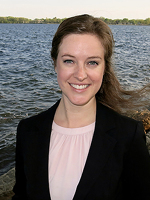
Nona Gronert
Nona Gronert is a doctoral student in Sociology. Her research focuses on sexual consent and sexual assault in the context of higher education. Her dissertation studies how the governance of sexual assault and harassment has changed at one large, public, Midwestern university from 1972 through 2017. In particular, Nona asks when and how the university has responded to the legal regulation of sexual violence, including Title IX of the Educational Amendments of 1972, the Clery Act, and the Campus Sexual Violence Elimination Act. Further, which regulations of sexual violence have become institutionalized at this school? Which regulations were promoted by local social movement organizations (SMOs)? Which regulations diffused from similar universities as “best practice”?
Nona’s other current project investigates study abroad coordinators and their students’ perceptions of gendered risk in Germany. This project has been generously supported by UW Madison’s Center for German and European Studies and Institute for Regional and International Studies. She aims to use Germany as a comparison case to understand the implications of university structures for the regulation, surveillance, and elimination of sexual assault and harassment. Nona hopes to identify what is unique to higher education in America by researching how study abroad students and on-site program staff address and understand sexual assault and harassment in Germany.
Nona received her B.A. with honors in Sociology and Spanish Literary Studies from Occidental College. Outside of her research, Nona serves on the board of Breakthrough Dance Company.

Dr. Angélica Guevara
Dr. Angélica Guevara works on disability rights in higher education. Being a neurodivergent Latina herself, she encountered countless obstacles when requesting her disability accommodations in the course of obtaining her B.A. from UCLA, her J.D. from UC Berkeley Law, and her Ph.D. from UC Berkeley’s Graduate School of Education. Having a non-apparent disability makes it difficult to be believed and often not fully accepted by people with apparent disabilities. Given the low expectations placed upon people with disabilities as a result of stigma and stereotypes makes it all the more challenging for people with disabilities to obtain their reasonable accommodations in higher education. People with disabilities were not expected to achieve so much. If they do reach such academic heights, they are seen as frauds or fakes because the sentiment is “how disabled are you if you got this far?”
The “Operation Varsity Blues” scandal exacerbated this sentiment, where wealthy parents were telling their kids to act “stupid” to be diagnosed with a disability to obtain more time on entrance exams. Unfortunately, such a fraudulent act by a few parents affects all students with non-apparent disabilities such as human immunodeficiency virus (HIV), multiple sclerosis (MS), psychiatric disabilities, learning disabilities, Attention-deficit/hyperactivity disorder (ADD/ADHD), diabetes, and dyslexia to name a few. Students with non-apparent disabilities already fear coming out of the closet and embrace their disability, and such scandals only marginalize this population, even more, fearing that they would be seen as “frauds” or “stupid” if they come out. Much of her work explores the intersectionality of the law concerning race, class, gender, and disability. She is exploring the idea of Smartness as Property in the legal field just as Cheryl I. Harris once proposed Whiteness as Property.
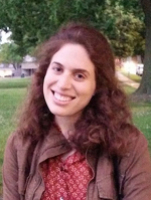
Chloe Haimson
Chloe Haimson is a doctoral candidate in the Sociology department at the University of Wisconsin-Madison. Her research examines both the direct and indirect consequences of incarceration, as well as the discretionary decisions made by professionals working in the criminal justice and court systems. For her dissertation, she is focusing on the role of parole supervision after prison in the reentry process and how parole agents perceive, as well as make choices about, the reentry trajectories of the people they supervise. She is also interested in the rising role of algorithmic tools in this process, as well as its impact on the broader criminal justice system. In other work, she has focused on the comparative reentry challenges facing people on parole and people who were formerly exonerated of crimes after their incarceration. Additionally, she has written and collected ethnographic data about the policing of protests, and served as a project assistant for Professor Tonya Brito and Professor David Pate on access to justice for low-income litigants in child support enforcement proceedings. She received her B.A. in sociology from Princeton University.
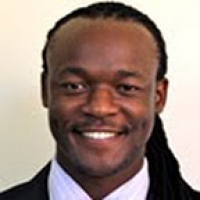
David Tinashe Hofisi
David Tinashe Hofisi is a doctoral candidate at the University of Wisconsin-Madison Law School. His research interests include constitutional law, legal history, courts, human rights and law and development. Prior to his current role in UW-Madison, David worked as human rights lawyer with the Zimbabwe Lawyers for Human Rights for seven years. He graduated with an LLM from Loyola University, Chicago and is a Mandela Washington Fellow under the Young African Leaders Initiative.
David’s doctoral project examines judicial review in common-law Africa, focussing on the emergence of constitutional courts. Stand-alone constitutional courts are not a typical institution of adjudication within common law Africa. They are more commonly found in Francophone/civil law Africa, due, in large part, to the effect of French colonization. The vast majority of Anglophone Africa inherited the supreme court model. Recently, African countries with common law traditions have established constitutional courts. South Africa’s established its Constitutional Court in 1993, Zimbabwe did the same through its 2013 Constitution and Zambia established its Constitutional Court in 2016. This research will investigate the extent to which these new courts enhance the role of the judiciary in the protection and enforcement of constitutionalism and human rights. It will focus on the Constitutional Courts of Zimbabwe and Zambia, whilst comparing them to the Supreme Court retained by Malawi. These three countries are English speaking common law jurisdictions which formed the Federation of Rhodesia and Nyasaland and received Lancaster House independence Constitutions. The research will reveal the efficacy of institutional variation in constitutional adjudication and the extent to which institutional choices influence outcomes in the context of constitutionalism and human rights

Youbin Kang
Youbin Kang is currently a doctoral candidate in the Department of Sociology at the University of Wisconsin, Madison. Her research centers around questions of how the changing forms of workplaces – through subcontracting, privatization, and global supply chains – affect workers, and how workers strategize and mobilize for better working conditions. Theoretically, in relation to her current project, she is interested in the effects of complementarity of polycentric legal institutions, the intersections of soft law and economic development, and the dilemma between the formalistic and instrumental character of law as shaped by social hierarchies and social movements. Her current project asks how the multi-layered global governance of labor rights affects the Bangladeshi garment industry after the Rana Plaza collapse. She uses a multi-method approach of in-depth interviews, focus group interviews, ethnographic observations, and descriptive statistics.
She has a B.A. in International Relations from Brown University, a B.F.A. in Textiles from the Rhode Island School of Design, and an M.Phil in Innovation, Strategy, Organisations from the University of Cambridge. Prior to starting graduate school, she worked at the International Labour Organization (ILO), a specialized agency of the United Nations.
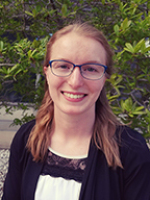
Morgan C. Matthews
Morgan C. Matthews is a doctoral candidate in sociology at the University of Wisconsin-Madison. Broadly, her research and teaching interests span the areas of gender, political sociology, work and organizations, and research methods. Her work focuses in particular on how inequalities in political representation are reproduced in legislative institutions in the United States.
In her dissertation, Morgan explores the processes by which partisan gender polarization has become institutionalized in U.S. state legislatures and how this contemporary phenomenon affects representation in politics. She addresses these questions through a combination of methods, including quantitative models of cross-state measures and comparative case studies of state legislatures in the West, Midwest, and Northeast. These case studies are based on content analysis of archival records, legislative interviews, and network analytic methods. Her dissertation synthesizes institutionalist approaches in sociology and political science and theorizes legislative institutions as workplaces where relations of power play out among political actors.
Morgan’s scholarship has appeared in Sociology Compass, Socius, and The Society Pages’ Feminist Reflections blog. Her research has been supported by The Tobin Project as well as the Law & Society Fellows Program. Prior to graduate school, Morgan was a Presidential Fellow at Dartmouth College’s Center for the Advancement of Learning. She holds an M.S. in sociology from UW-Madison and an A.B. in sociology from Dartmouth College.
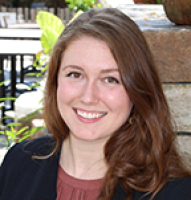
Anna Oltman
Anna Oltman is a doctoral candidate in the Department of Political Science at the University of Wisconsin-Madison. Her research assesses the determinants of refugee protection and immigration policy, with a specific focus on how domestic institutions affect compliance with international refugee law.
Asylum, despite its importance in the international human rights regime and its increasing political salience, remains under-studied as a political phenomenon. In her dissertation, Anna presents an original dataset of “refugee status determination” (RSD) regimes in developed democracies. These data, compiled using government, NGO, and UNHCR reports, as well as discussions with policymakers in several countries, show considerable variation in how developed democracies conduct RSD. In particular, two broad categories of countries emerge: those with fractured and relatively autonomous RSD institutions, and those with RSD institutions that are centralized and simple for leaders to intervene in. Her research then shows that even where delegation to bureaucratic or judicial asylum adjudicators makes it more likely that states comply with the letter of international refugee law, they often still engage in practices intended to deny protection to vulnerable individuals. These findings highlight the inherent tensions between international humanitarian law and immigration politics in refugee destination countries.
Anna holds a B.A. in Government from Franklin & Marshall College and an M.A. in Political Science from the University of Wisconsin-Madison. Her research and commentary have been featured in Political Violence at a Glance, The Monkey Cage, and The Oxford Encyclopedia of Foreign Policy Analysis.
